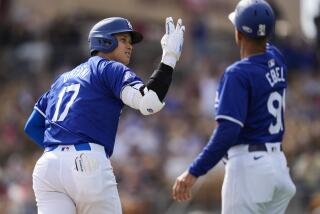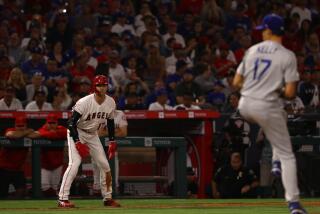Newest Dodger Moves Up From ‘Down Under’
- Share via
Craig Shipley, quite the maverick, integrated baseball Sunday at Dodger Stadium. A gentle pat on the rump by first-base coach Manny Mota made it official.
No one probably ever imagined it, yet there was Shipley, running out his first at-bat, scoring Alex Trevino from third.
Thirty-nine years after Jackie Robinson broke the color barrier at Ebbets Field, Craig Shipley became the first Australian to play in the major leagues.
Immediately establishing himself as his country’s most popular export since Fosters’, Shipley--who Saturday night was with Albuquerque--sacrificed in a run in his first at-bat and sliced a single to left in his second. And though he was only 1 for 4 and not one ball was hit his way at shortstop, it was a momentous day for Shipley.
“This was a dream of mine since I came over here,” he said. “I really didn’t believe it. I had to sit down and think about it.”
The match was made because the Dodgers were short of shortstops, and he had a good glove. Out was starter Mariano Duncan, who twisted his left ankle Friday, and utility infielder Dave Anderson, who fractured the little finger on his right hand bad enough Saturday to be placed on the 21-day disabled list. Also unavailable was Bill Russell, who filled in at third base for an ailing Bill Madlock.
Notified of his promotion Saturday night during the seventh inning of a 6-4 victory at Portland, Shipley’s parade to the majors consisted of a 7 a.m. Western Airlines flight with teammate Ed Amelung. That was enough time to pack and call his parents, his former University of Alabama coach, and a couple friends.
“I told them to spread the word,” he said.
Shipley isn’t sure if the word will mean as much to his countrymen as it does to him. Although the World Series and some highlights are televised in Australia, apparently the 16-hour time gap has left the two countries a world apart.
As a child, Shipley--whose father played for a team in Sydney--had few friends who were familiar with the game. He had to go out of his area to find a team to play with.
“When I signed (with the Dodgers in 1984), it was in the papers, but it really wasn’t a big deal,” he said.
In a post-game Dodger locker room, Shipley, too, seemed a bit unsure of what had just transpired. While Tom Niedenfuer melted in his chair across the way, disgusted with his performance, Shipley was surrounded by lights, microphones, and questions about boomerangs and vegemite sandwiches.
“It’s hard to explain,” he said. “I was in Portland last night, and even though I’m in the big leagues now, it really hasn’t hit me.
“I want to go out of here (the stadium), sit down and relax, and just think about it all. Maybe I’ll make some more calls.”
When he arrived at 9 a.m. Sunday, he didn’t expect to start.
“Next thing I knew, I was in the lineup,” he said. “I just tried to concentrate on the pitcher. I tried not to look around at the crowd (of 42,236).”
Raised in Sydney, Shipley came to the United States in January, 1982. No timid Aussie, Shipley hit a home run in his first game for the University of Alabama. Since then, Shipley has gone back to doing what shortstops are supposed to do--stealing bases and scoring runs.
After three seasons at Alabama, one of which ended with the Crimson Tide finishing second in the 1983 College World Series, he moved on to the Dodgers’ A farm club in Vero Beach, Fla. There, he batted .280 in 85 games with 56 runs scored and 18 stolen bases.
In 1985, Shipley was moved up to Triple A affiliate Albuquerque, where he batted .242 with 24 stolen bases.
By the time the Dodgers called, Shipley had played in only 38 games. But his switch-hitting .309 batting average and fielding ability were obviously impressive enough.
With Duncan and Madlock healing, Shipley doesn’t know how long he’ll be around. But even if it doesn’t last, it was a learning experience for all. That includes pitcher Jerry Reuss, who never knew of Australian baseball.
“I imagine if he made it,” Reuss said, “I guess they do play baseball down there.”
More to Read
Are you a true-blue fan?
Get our Dodgers Dugout newsletter for insights, news and much more.
You may occasionally receive promotional content from the Los Angeles Times.







